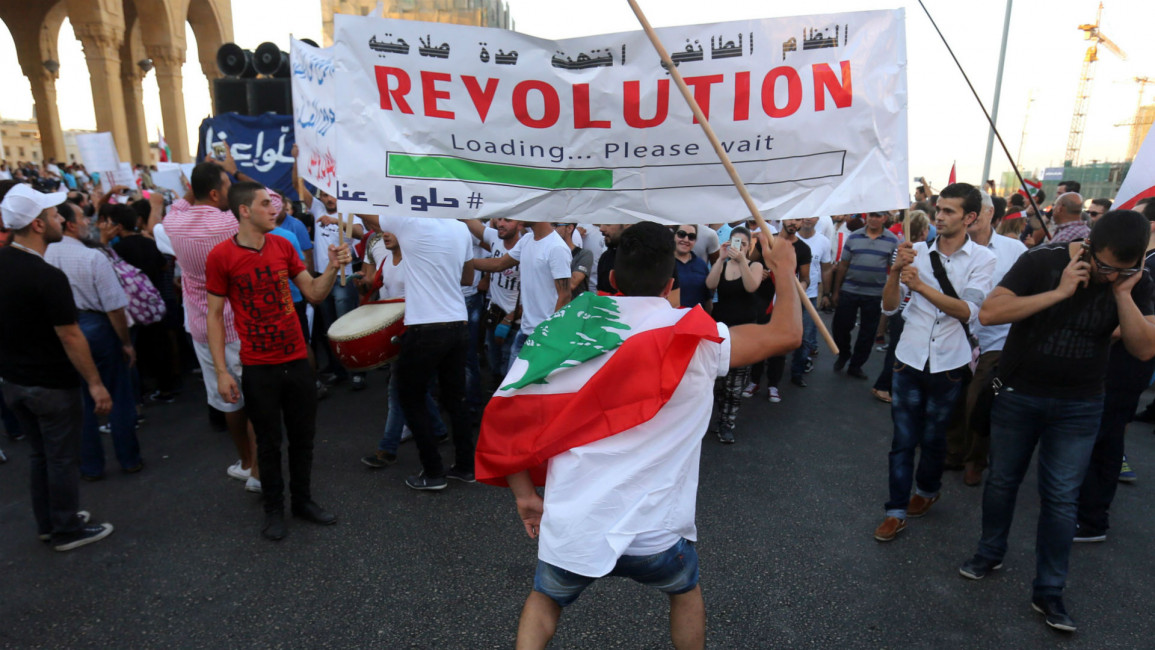
Why the Lebanese protesters should be cautious
The battle with the political regime, initiated by a number of otherwise apolitical groups, appears to be promising thus far, with a significant increase in protester numbers over the past few weeks.
In the meantime, major political groups have attempted to incorporate the movement for their own advantage. Michel Aoun and Walid Jumblatt, two of Lebanon's sectarian leaders, were among the first to endorse the movement and its demands.
Jumblatt, however, immediately withdrew his direct support and continued to approve of protest demands only from a distance, and only then saying he supported "the reforms called for by the new generation".
While part of Jumblatt's motivation is to boost the name and profile of his son, Taymour, in a bid to cling to some form of dynastic influence, Michel Aoun has different aims altogether.
Aoun is using the street protests to resurrect the slogans raised by his Free Patriotic Movement in 2005 upon the return of the party as an active group in Lebanese politics.
Aoun is continuing to manoeuvre his position in the hope of one day becoming president - his long-term goal for several years already.
Rejection
The crowds on the street, however, are not easily manipulated. The FPM's involvement in demonstrations was met with an explicit and clear-cut rejection by protesters, who recognised that the involvement of major political groups could signal the end of the grass-roots movement.
| Infiltration by political groups saw the 2012 protest movement disbanded |
The Future Movement, the largely secular and economically liberal bloc led by Saad Hariri, has also found itself in a bind.
Several explicit protest demands have directly attacked the minister of interior and municipalities, Nohad Machnouk, a member of the Future Movement, over alleged violations of the rights of those arrested during the demonstrations - reportedly refusing to provide them with lawyers and enforcing nonconsensual drug tests.
The significance of the protests and their achievements up to this point should be clear. But it is important to be wary of their possible manipulation for the sake of their dissolution, and ensuring they remain obsolete.
Lebanon saw a similar, though less influential, series of protests in 2012. The grassroots movement back then called for the end of the sectarian regime - but was soon torn apart over political differences, including the question of Hizballah's arms and the funding of the ongoing tribunal into the attack that killed Rafic Hariri, Saad's father, and a former prime minister, in 2005.
Infiltration by political groups saw the 2012 protest movement disbanded as a result of the same deadlock over the same contentious national issues that have left the country's legislature in an impasse for years.
This model is, no doubt, similar to the pattern followed many of the "Arab Spring" uprisings. Though these protests began with massive demonstrations calling for political reform and civic rights, the old regime soon found its way back to power through taking advantage of political disruption.
The clearest example of this is Egypt, where the army's assumption of power and the ousting of the Muslim Brotherhood from rule signalled the return of the old regime. This was also made glaringly obvious by the clearing of Mubarak's name on all charges.
Yet the fact that the movement has so far managed to circumvent political infiltration does not mean that it is free from risk. The important question is how protesters can continue to avoid being geared towards internal dissent and hence dissolution.
| Reducing protesters' demands to agreeing a president serves only to halt the movement's momentum |
This becomes especially important now given that one of the organisers, the "You Stink" group, has announced its plan to escalate its acts from Tuesday if its demands remain unmet.
Possible way forward
One way political groups have sought to break the deadlock is through floating the idea of electing a new president - which would automatically lead to the resignation of the current government and the formation of a new one.
This seems to be a common aim for all Lebanon's major political parties, though they are in disagreement as to how to go about it.
Aoun is lobbying for direct popular elections, which gives him better chances for winning. But the Future Movement and its allies continue to push for a new president to be elected by parliament - guaranteeing that Aoun would not become president.
In either case, however, electing a president will not resolve any of the central issues at hand - as fresh elections will likely lead merely to the re-election of the same political groups, and thus the reproduction of the same regime, the same impasse.
The attempt to reduce protesters' demands to the single aim of agreeing a president serves only to bring a halt to the movement's momentum and achievements thus far.
Accordingly, it is imperative that the organising movements are cautious of purchasing illusory reform at the expense of the zealous population - while several crises continue to plague the country.
Karim Barakat is an instructor of philosophy in the American University of Beirut.
Opinions expressed in this article remain those of the author and do not necessarily represent those of al-Araby al-Jadeed, its editorial board or staff.




